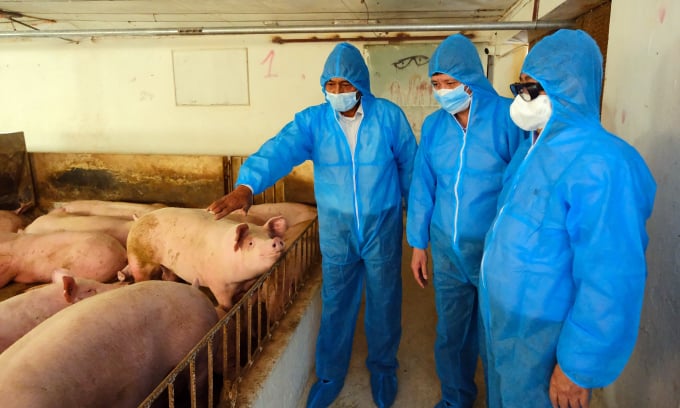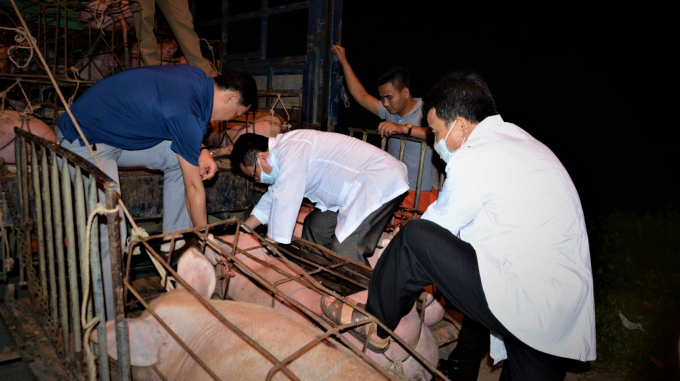November 28, 2025 | 01:07 GMT +7
November 28, 2025 | 01:07 GMT +7
Hotline: 0913.378.918
November 28, 2025 | 01:07 GMT +7
Hotline: 0913.378.918
Currently, African swine fever (ASF) occurs in 2,275 communes of 57 provinces and centrally-run cities. More than 230,000 pigs were culled, nearly 3 times higher than that of the same period in 2020, and accounting for about 0.8 per cent of the total pig population in the country.
The epidemic has the potential to spread on a large scale, leaving negative impacts on the livestock industry and business activities of many businesses, cooperatives, breeders and food supply.
To promptly and effectively prevent and control the ASF and ensure the supply of pork during the Lunar New Year, Deputy Prime Minister Le Van Thanh has just signed Directive 32/CT-TTg on November 25, 2020 which includes drastic comprehensive solutions for ASF prevention and control.

Minister of Agriculture and Rural Development (right) visits a pig farms in Hanoi late October, 2021. Photo: Bao Thang
As the focal agency, the Ministry of Agriculture and Rural Development is assigned five specific tasks. Firstly, the ministry would coordinate with ministries, agencies and localities in guiding, urging, and inspecting the ASF prevention and control work.
Closely monitor the epidemic situation, ensure early detection for timely responses.
Secondly, the ministry would guide livestock breeders and grassroots veterinarians to regularly monitor pig herds and apply biosecurity measures in livestock production including cleaning, disinfecting and disinfecting farms with lime powder and chemicals. The Deputy Prime Minister called for stepping up the construction of disease-free breeding facilities and areas.
Thirdly, the ministry was also asked to focus on implementing the Project "Strengthening the capacity of the veterinary management agency system at all levels, period 2021-2030" issued together with Decision No. 414/QD-TTg dated 22/3/2021 of the Prime Minister.
Fourthly, the agriculture ministry coordinates with the Ministry of Home Affairs in issuing documents specifying the functions, duties and powers of veterinary specialized management agencies at all levels, ensuring compliance with current regulations and meeting practica needs.
Fifth, it is necessary to actively coordinate with international organisations that are supporting Vietnam in ASF prevention and control.
Under Directive 32/CT-TTg, chairpersons of People's Committees of provinces and centrally-run cities are required to arrange resources to implement preventive measures.
Specifically, localities must completely deal with outbreaks, not allow new outbreaks to arise. Localities organise the destruction of infected, suspected or dead animals, as well as clean, disinfect farms with lime powder and chemicals.
Cases of trading and transporting animals and animal products that cause epidemics must be promptly detected, prevented and handled.
Localities must strengthen the Steering Committee for Animal Disease Prevention and Control, working groups at all levels and assigning specific responsibilities to each member in disease prevention and control work.

Officiers examine ASF prevention and control work in Ha Giang Province.Photo: Ba Thang.
Localities are also required to direct functional forces to closely monitor and control at border gates, trails, and border crossings for people and vehicles from ASF-hit countries to enter Vietnam.
Communication campaigns are needed to call on people not to participate in cross-border trading and smuggling of pigs and pig products. Violations would be strictly punished.
Localities also need to strengthen the capacity of the veterinary management system at all levels, especially at the district and commune levels according to the Law on Veterinary Medicine, the direction of the Secretariat, the National Assembly, the Government and Decision No. 414/ Decision-TTg dated March 22, 2021 of the Prime Minister to ensure timely and effective anti-epidemic resources.
The Directive 32/CT-TTg also mentions the role of the National Steering Committee against Smuggling, Trade Fraud and Counterfeiting (National Steering Committee 389) and The Steering Committee 389 of the provinces and centrally-run cities, asking the organisations to strengthen patrol and control with the group of illegal transporters.
In addition, the Ministry of Public Security is required to monitor the situation and update the list of suspected having signs of trading, transporting and consuming smuggled pigs and pig products.
The Ministry of Information and Communications is asked to increase reporting about the ASF situation and the disease prevention and control measures. The Ministry of Finance shall allocate sufficient funds for disease prevention and control.
Translated by Hien Anh
/2025/11/27/3830-1-152901_403.jpg)
(VAN) Dong Nai is developing its key crop areas, expanding planting area codes, and applying high technology to increase the value of agricultural products, aiming at a green and sustainable agriculture.

(VAN) Tay Ninh’s livestock sector is undergoing a major transformation, applying high-tech, closed-loop circular models to build sustainable value chains.
/2025/11/26/3627-4-082628_818.jpg)
(VAN) From a small café on the red basalt highlands, Le Van Hoang started a business with clean coffee, building Enjoi Coffee into a symbol of organic agriculture in the Lam Dong plateau.
/2025/11/25/0045-1-135246_13.jpg)
(VAN) Ca Mau is researching a model of sea-encroaching embankments combined with viaducts and logistics service zones, aiming both to prevent erosion and create land funds for marine economic development.

(VAN) The information was shared at the seminar 'Urban Agriculture - Solutions for Developing Green Spaces,' organized by the Kinh te & Do thi Newspaper and the Biotechnology Center of Ho Chi Minh City.
/2025/11/19/4141-2-132831_216.jpg)
(VAN) One of Japfa's outstanding solutions is implementing digital transformation and artificial intelligence (AI) to optimize operations, enhance productivity, and advance sustainable development.
/2025/11/19/4847-1-093540_448.jpg)
(VAN) The Gia Lai Provincial People’s Committee had a working session with the delegation of the U.S. Department of Agriculture, the State of Idaho, and representatives of the State's leading enterprises.